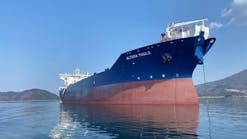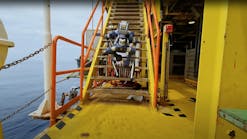Offshore staff
STAVANGER, Norway – Lloyd’s Register (LR) has released several updated services and sets during the opening day of ONS 2016.
It has updated its Submersibles and Dive Systems Rules, which set standards for design, construction, and lifetime maintenance of submersible units and dive systems. The rule set covers manned and un-manned submersible craft, diving bells, habitats, containers, de-compression chambers, and hyperbaric systems.
Garry Lyon, technical lead and rule owner at LR, said: “To keep pace with changes in technology, market trends and new legislation, we are dedicated to an on-going program of research and development to enhance existing technical standards and to publish new rules on an annual basis. We released an updated rule set in December 2015. The July release means that all of our rule sets are aligned and updates are released at the same time of the year and on an annual basis.
“We work closely with industry to develop and improve the rules that are proven to be industry best practice and leading edge engineering principles. We meet annually with our Technical Committee to ensure that we keep up-to-date with new trends, and get industry feedback.”
This year’s updates have focused on the usability of the rules set.
“It is essential for our rule set to be easy to use by our clients. We have just one rule set for Submersibles and Dive Systems and now a comprehensive matrix has been added to help the reader navigate their way through with ease,” said Lyon.
In addition, the consultancy announced a new risk-based inspection (RBI) service that combines hull integrity management with class to help minimize costs for operators of floating offshore installations.
LR said that the service is expected to be of interest to operators of floating units at a fixed location, such as FPSO and FLNG vessels.
RBI detects and monitors systems, subsystems, equipment and component degradation and results in the application of appropriate decision-making criteria to manage risk to acceptable levels.
Richard Nott, Head of Offshore & Global Projects, said: “The most common deterioration mechanisms associated with hull structure components range from coating failures, through to fatigue and stress built in to the structure during construction. RBI can help assess all of these issues and prioritise inspection needs.”
Nott continues: “The key to understanding how classification, verification, and integrity fit together is in understanding what differences there are between integrity management and classification schemes. We understand this in detail and have launched this new service because these two schemes can be integrated, and the overall result will optimise survey and inspection activities.”
The introduction of an RBI approach aligns the requirements for class, verification, and hull integrity management into a single survey and inspection program, not necessarily predicated on prescriptive inspection periodicities.
LR also introduced a new well integrity assurance service designed to provide greater efficiency and cost savings for oil and gas operators by combining well examination services with independent verification.
Well Examination services and Independent Competent Person (ICP) services are required by UK operators for fixed and floating assets. Historically, across the industry, these services have been contracted and managed independently from one another, LR said its new solution will help operators faced with challenging market economics.
“Our life-cycle Well Examination services aren’t just applicable in the UK market. Regardless of global location, well examination provides you with an auditable and independent process for demonstrating full compliance with local regulations, company policies and good industry practice in relation to the full life-cycle of well operations,” says Ian Mackay, Lloyd’s Register’s Technical Manager for Compliance Operations.
In the UK, drilling operators or holders of licenses for hydrocarbons are legally obligated to follow regulations in the Offshore Installations such as the Offshore Safety Directive and Safety Case Regulations 2015. The current European Parliament EU Directive (2013/30/EU) on Safety of Offshore Oil and Gas Operations also directs member states to introduce well examination into their legislative regimes, and it directs that EU-headquartered operators adopt the same management standards across their global operations.
08/29/2016




